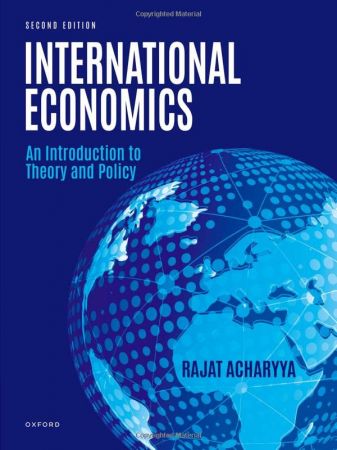
English | 2022 | ISBN: 0192865145, 978-0192865144 | 657 pages | True PDF | 15.43 MB
Complementing trade theories with relevant trade empirics, this book covers three aspects of the study of International Economics: pure theory of trade, trade policy, and theory of Balance of Payments (BoP) and exchange rate. In the first part, it discusses the basic principles of international trade between dissimilar countries as well as between similar countries, and implications thereof in terms of welfare, income distribution, and growth. The approach taken here is distinctly different from that in most of the existing textbooks on international economics. Instead of model-specific discussions of the basic issues, it discusses the basic principles governing trade, gains from trade, and characteristics of international equilibrium in the context of a general trading environment of open economies. Subsequently, specific models of trade are introduced as alternative theoretical explanations for the basic principles of trade. In the second part, a wide range of policy issues are
analysed including unilateral trade restrictions and promotions; reciprocatory trade policy choices through regionalism; product standards that regulate trade between developed and developing countries; and implications of capital inflow, FDI, fragmentation, and global value chains. In the third part, the book discusses different currency and exchange rate regimes and their implications for a country's balance of payments and foreign exchange reserves. Drawing upon the basic theories, it studies expenditure-reducing and expenditure-switching policies to correct for BoP imbalances under a pegged exchange rate regime. Finally, some reflections on the choice of exchange rate regime and optimum currency area wind up discussions of monetary issues in international economics.



![S.T.A.L.K.E.R. 2 / STALKER 2: Heart of Chornobyl - Ultimate Edition (2024) [+UPDATE 23.12.2024 - v1.1.3] ElAmigos / Polska wersja językowa](https://i.postimg.cc/Zqd8RWGY/UZG8PBE.jpg)



















































![David Gilmour - Luck and Strange (2024) [FLAC]](https://i.imgur.com/everaBc.jpeg)
![Męskie Granie Orkiestra - Męskie Granie 2024 (2024) [FLAC]](https://i.imgur.com/FAyOxrM.jpeg)
![The Rolling Stones - Hackney Diamonds (2023) [FLAC]](https://i.imgur.com/wCkyyUN.jpg)
![Lady Gaga - Harlequin (2024) [FLAC]](https://i.imgur.com/dcgIA8D.jpeg)
![Natalia Kukulska - Dobrostan (2024) [FLAC]](https://i.imgur.com/bdljG3O.jpeg)
![Kaśka Sochacka - Ta druga (2024) [FLAC]](https://i.imgur.com/hORQKvn.jpeg)
![Kuba Sienkiewicz - Pani Bóg (2024) [FLAC]](https://i.imgur.com/qijCx8Z.jpeg)
![Lanberry - Heca (2024) [FLAC]](https://i.imgur.com/8P7QfeR.jpeg)
![Sara James - PLAYHOUSE (2024) [FLAC]](https://i.imgur.com/m4f8OKg.jpeg)
![Grzegorz Hyży - EPILOG (2024) [FLAC]](https://i.imgur.com/8DA2sBr.jpeg)
![Myslovitz - WIECZORAMI CHŁOPCY WYCHODZĄ NA ULICE (2024) [FLAC]](https://i.imgur.com/l9mMtIG.jpeg)
![Krzysztof Zalewski - ZGŁOWY (2024) [FLAC]](https://i.imgur.com/vh48RAc.jpeg)
![Krzysztof Cugowski - Wiek to tylko liczba (2024) [FLAC]](https://i.imgur.com/SBzgqe2.jpeg)
![Nosowska - Kasia i Błażej (2024) [FLAC]](https://i.imgur.com/mObvVXQ.jpeg)
![sanah - Pianinkowe Kaprysy (2024) [FLAC]](https://i.imgur.com/pVjjPAa.jpeg)
![Kwiat Jabłoni - Pokaz slajdów (2023) [FLAC]](https://i.imgur.com/diERHfZ.jpg)
![Robert Cichy - Spacer po Warszawie (2024) [FLAC]](https://i.imgur.com/ixleU9o.jpeg)
![Viki Gabor - Terminal 3 (2024) [FLAC]](https://i.imgur.com/Q1KCnDs.jpeg)
![Sanah - Kaprysy (2024) [FLAC]](https://i.imgur.com/71OZm4h.jpeg)
![Męskie Granie Orkiestra - Męskie Granie 2023 (2023) [FLAC]](https://i.imgur.com/U4YHo8d.jpg)




